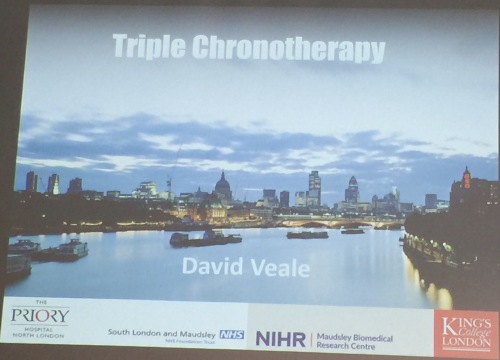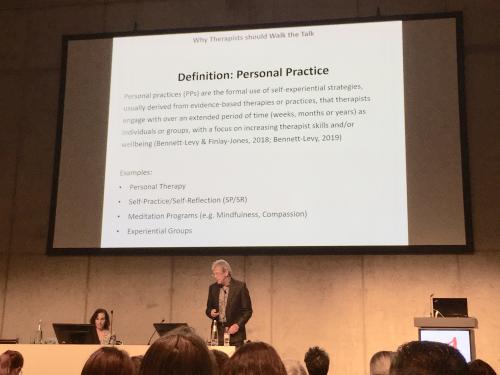Accentuate the positive: how to go about it
Last updated on 16th October 2019
"You've got to spread joy up to the maximum. Bring gloom down to the minimum. Otherwise pandemonium ... Liable to walk upon the scene". Bing Crosby sings

"You've got to spread joy up to the maximum. Bring gloom down to the minimum. Otherwise pandemonium ... Liable to walk upon the scene". Bing Crosby sings
"You've got to accentuate the positive. Eliminate the negative. Latch onto the affirmative. Don't mess with Mr In-Between". Bing Crosby sings!
'Breaking Convention' - the fifth biennial international conference on psychedelics - took place at Greenwich University in London from 16th-18th August. There were apparently 1,200 or so attendees for the 6 concurrent programmes - academic, workshop, performance, cinema, entertainment & installations - as well as an art exhibition. I went primarily because it allowed me to hear pretty much all the relevant research groups in the UK present on their current findings. As you can see from the other quite extensive writing about psychedelics on this website, I'm very interested in the encouraging emerging research highlighting potential therapeutic value of psychedelics. Although I focussed on the academic programme, there was much too much even here to manage an ove
The universe is full of magical things patiently waiting for our wits to grow sharper. Eden Phillpotts
At the recent World Congress of Behavioural & Cognitive Therapies in Berlin, David Veale from King's College & the Maudsley reported on a randomised controlled trial of 'triple chronotherapy' for depression.

David pointed out that depression can come in all kinds of shapes & sizes, and this treatment probably works best in the subtype where circadian rhythms have become desynchronised.
This is the third & last day of the conference proper ...
More to follow

Well this was a fascinating day ... I went to my friend James Bennett-Levy's fine symposium on "Self-practice/self-reflection (SP-SR) at 18: an experiential training strategy maturing into adulthood", then on to an interesting & helpful symposium discussing broader applications of Arnoud Arntz's imagery approaches - "Efficacy of imagery rescripting as a transdiagnostic intervention". And to complete the morning's cornucopia I was back listening to James delivering a barn-storming plenary on "Personal practice: why therapists should walk the talk." I sat with Judy, James's wife, and we considered standing to applaud at the end but decided this might be a bit over-the-top, even if richly deserved.
I wrote yesterday about a pre-conference workshop I attended on "Reimagining CBT for depression" with Keith Dobson. Today is the first of the three full days of the '9th World Congress of Behavioural & Cognitive Therapies' conference proper. They aren't taking any prisoners ... each day runs from 8.30am to 6.00pm. My Airbnb is about a 40 minute walk from the CityCube conference centre, so the day pretty much runs from 7.30am to 7.00pm ... not a holiday!
I'm at the '9th World Congress of Behavioural & Cognitive Therapies' in Berlin. As is routine with these kinds of events, the day before is taken up with pre-conference workshops. There are 31 of them! 18 are full-day and the rest half-day. A lot of choice. I've gone for "Reimagining CBT for major depression" with Keith Dobson. The full title includes " ... : using a contextual framework to conceptualize and treat depression."
Poor muscle strength predicts increased vulnerability to both physical & psychological health problems and earlier death, in addition to the contribution of poor aerobic, heart-lung fitness. This is true for both men & women and for all assessed age ranges. Mechanisms underlying these effects are probably multifactorial, including metabolic/biochemical, neurological & psychological factors. Research studies have assessed overall muscular strength in a variety of ways including grip strength, push-ups, chair-stands, and squat weight-lifts. Happily, muscle strengthening interventions can yield major benefits across multiple health domains. Here are a dozen interesting papers addressing these areas published in the last few years:
I've been asked to write a short book section on "Psychedelics and dying" and that has nudged me into looking at this territory here on the blog. It's a fascinating subject in all kinds of ways. With the limited space I have, I'd like to comment briefly on four overlapping areas. One is the growing body of research showing that psychedelic-assisted therapy can dramatically ease severe existential distress associated with terminal illness. A second, less well studied area, is the observation that psychedelic experience reduces death anxiety in the general population. Thirdly, it's interesting to note the similarities between some descriptions of psychedelic states and reports of near death experiences. And lastly I'd like to talk about how psychedelics might produce these effects.